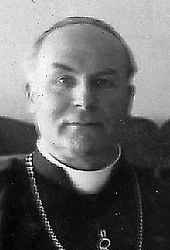Diaries of Michael Cardinal von Faulhaber
As diaries of Cardinal Michael von Faulhaber refers to a bundle of documents (diaries, visitors diaries, supplementary sheets, etc.), Michael von Faulhaber during his time as bishop of Speyer and as archbishop of Munich and Freising led. They are to be edited and published online between 2014 and 2026.
history
Faulhaber, who was a close confidante of Pope Pius XI. was and had numerous contacts with influential personalities at home and abroad, wrote down in his diaries every day what he had done and with whom he had talked about what. The consistently transmitted diaries comprise 32 volumes in notebook format as well as around 400 meeting minutes and memos from the period from 1911 to his death in June 1952. In the diaries, entries for around 52,000 visits and conversations are noted for around 15,000 days.
Faulhaber wrote closely in ink, mostly in the shorthand Gabelsberger . The entries are mostly kept short; He prepared detailed supplements for thoughts on more important topics and discussions. After Faulhaber's death, his last private secretary, Johannes Waxenberger, took the diaries and kept them in his house in Siegsdorf. After Waxenberger's death in the summer of 2010, they came to the Archbishop's Archives in Munich together with other documents. After the 60-year protection period for archbishop's documents, the Munich Archbishop Reinhard Marx ordered the diaries to be made available to the public.
Funded by the German Research Foundation , a twelve-year project for the scientific processing of the diaries began in October 2013 under the direction of Andreas Wirsching , Director of the Institute for Contemporary History in Munich, and the church historian Hubert Wolf .
Diary entries from the years 1918, 1919 and 1933 have been available online as digital copies and transcriptions since October 2015 .
Possible use of the edition
The diaries cover the time of the German Empire under Wilhelm II , the Weimar Republic , the Third Reich , the years 1945 to 1949 and the first three years of the Federal Republic of Germany under Konrad Adenauer . It is possible that they will provide new insights into the relationship of the Holy See to politicians of these ages.
Web links
- Critical online edition of the diaries of Michael Cardinal von Faulhaber (1911–1952) (website of the project)
- Press release of the Archbishop's Office of Munich on the edition project (PDF)
- Press release of the participating researchers on the edition project on the archbishop's office (PDF)
- Information on the project on one page of the seminar for Middle and Modern Church History of the Catholic Theological Faculty of the University of Münster
Footnotes
- ↑ The visiting diaries as a key to the archival categories in the Faulhuber estate
- ↑ www.faulhaber-edition.de/Stock
- ↑ Press release of the Archdiocese of Munich and Freising: First excerpts from Cardinal Faulhaber's diaries online ( memento of October 29, 2015 in the web archive archive.today )
